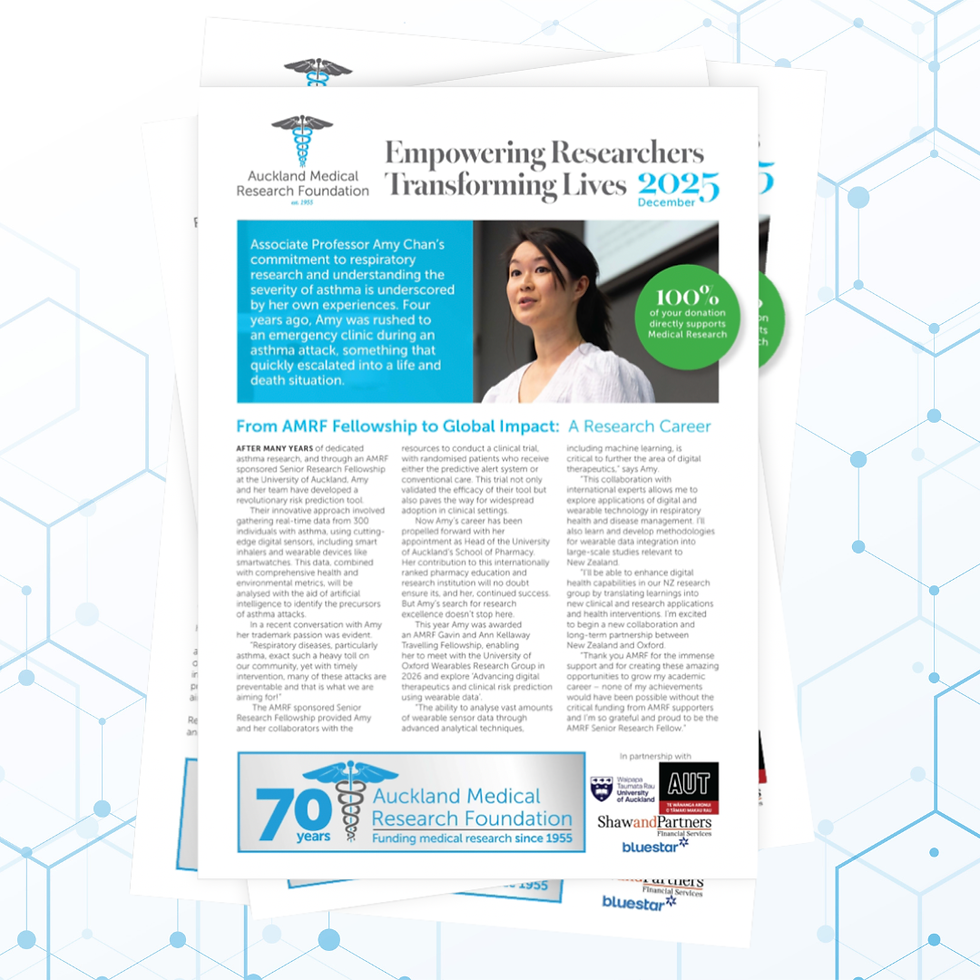Predicting Cardiovascular Risks in Cancer Patients
- AMRF
- May 7, 2021
- 3 min read
Updated: Dec 2, 2024
With a deep-seated passion for improving quality of life and outcomes for cancer patients, Professor Mark Elwood and Dr Essa Tawfiq are working to discover more about the correlation between cancer and cardiovascular disease (CVD), and how this information can be used to make improvements in policies, systems and patient treatment.
In New Zealand healthcare, a system called PREDICT is used to assess people’s future risk of cardiovascular disease (CVD), heart attacks and related diseases, to help make treatment decisions primarily around lipid-lowering and blood pressure lowering treatments.
Professor Elwood and Dr Tawfiq are working together with their research team on a two-year project in which they use anonymous data from PREDICT – along with data from a secondary system – VARIANZ – to test whether these systems give accurate results for cancer patients, and if this can be improved. The team will assess whether the risks of CVD are increased in cancer patients, giving particular attention to Māori and Pacific populations, who have higher rates of CVD and higher rates of death from cancer.

This research will give valuable new information on CVD and cancer, and improve the treatment of individual patients, health policies and systems.
64% of cancer patients in New Zealand live more than 5 years after diagnosis. Currently that means 95,000 cancer survivors live in NZ. Apart from cancer, the greatest risk to these patients is cardiovascular disease. The need for CVD risk prediction models in cancer patients is a current issue in NZ, with a distinct lack of research in this area.
In the words of Professor Elwood and Doctor Tawfiq:
“Our research can have significant impact on risk assessment and management of CVD in cancer patients. Saying that, cancer patients may have better quality of life and longer survival years.”
“With the aim of improving clinical care for individual cancer patients in NZ, our research outcomes will be incorporated into the current computerized CVD risk assessment tools. In clinical practice, the computerized CVD risk prediction models will be supplemented with the option of cancer related questions.
This work will allow the CVD risk assessment tools already validated in general populations to be used in the management of individual cancer patients with good prognosis, in primary and specialist care. It will also inform healthcare system decision making to improve care for cancer patients. The importance of such tools in predicting CVD risk in cancer patients has been emphasized, and the limitations in the performance of existing CVD risk prediction tools in cancer patients have been shown by several studies. CVD risks are important in good-prognosis cancer patients; many will survive their cancer but suffer from CVD.”
“This research can contribute to the continuum of cancer care via establishing, improving, and maintaining coordination between health care providers. The research will be relevant in developing new or revised clinical guidelines and in policy decisions for improving cancer care for patients, their whānau, friends and communities affected by cancer.”
The research of Prof Elwood and Dr Tawfiq is made possible only through the generous donations of people like yourself, enabling the Auckland Medical Research Foundation to continue funding vital Kiwi research projects that hold lasting impact for future generations. Please consider making a donation to AMRF through the link below, and help us to continue supporting medical researchers in New Zealand.
Auckland Medical Research Foundation are delighted to have Prof Mark Elwood join us as guest lecturer at our free public lecture on cancer research, on July 13 2021. To register your interest in this please email events@medicalresearch.org.nz




